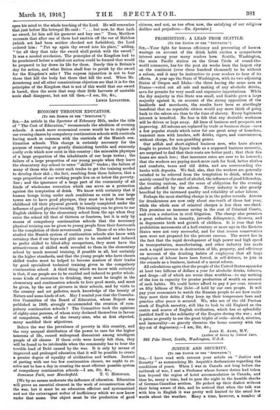ECONOMY THROUGH EDUCATION. [To THE Eenroa or TEE " SPECTATOR."]
Sin,—An article in the Spectator of February 26th, under the title of " The Cost of Education," recommends the abolition of evening schools. A much more economical course would be to replace all our evening classes by compulsory continuation schools with curricula having much in common with the curricula of the Munich con- tinuation schools. This change is certainly necessary for the purpose of removing or greatly diminishing terrible and ruinously costly evils which now exist in this country : the miserable physique of a large proportion of the inhabitants of our large towns ; the failure of a large proportion of our young people when they leave the elementary day-school to enter " skilled " trades ; the failure of many of those who do enter such trades to get the training needed to develop their Ail- ; the fact, resulting from these failures, that a large proportion of our working people live on or below the poverty- line ; and the ignorance of a large part of the community of all kinds of wholesome recreation which can serve as a protection against the temptation of drink We know with certainty that if human beings living under such conditions as exist in our large towns are to have good physique, they must be kept from early childhood till their physical growth is nearly completed under the influence of good physical training. This training can be given to our English children by the elementary school from the age when they enter the school till that of thirteen or fourteen, but it is only by means of compulsory continuation schools that the necessary physical training can be given to young people from their fourteenth to the completion of their seventeenth year. Those of us who have studied the Munich system of continuation schools also know with certainty that if our boys and girls are to be enabled and induced to prefer skilled to blind-alley occupations, they must have the attractiveness of skilled work revealed to them in the elementary school by much manual training, if possible in all, but certainly in the higher standards, and that the young people who have chosen skilled trades must be helped to become masters of their trades by good specialized technical training given in the compulsory continuation school A third thing which we know with certainty is that, if our people are to be enabled and induced to prefer whole- some kinds of recreation to drinking, they must be taught in the elementary and continuation schools to love good music, and must be given, by the use of pictures in their schools, and by visits to the country and art galleries, much knowledge of the beauty of Nature and some kinds of art. May I remind you that the Consulta- tive Committee of the Board of Education, whose Report was published in 1909, strongly recommended the creation of com- pulsory continuation schools ? The Committee took the opinions of eighty-nine persons, of whom sixty declared themselves in favour of compulsion, while of the twenty-nine, who at first objected, many modified their objections.
Before the war the prevalence of poverty in this country, and the very unequal distribution of the power to care for the higher interests of life, caused widespread discontent among intelligent people of all classes. If those evils were keenly felt then, they will be found to be intolerable when the community has to bear the terrible load of Debt caused by the war. It is only by means of improved and prolonged education that it will be possible to create a greater degree of equality of civilization and welfare. Instead of parting with our too few continuation classes, we ought to re- solve not to lose a day in creating the most efficient possible system of compulsory continuation schools.—I am, Sir, &c., Stoanscoe Park, near Macckafteld. T. C. HOBEFALL.
[We by no means underrate the influence of education. Education will prove an essential element in the work of reconstruction after the war, but it must be an education efficient and systematized and not the extravagant welter of inefficiency which we now know under that name. Our object must be the production of good citizens, and not, as too often now, the satisfying of our religious dislikes and prejudices.—En. Spectator.]


































 Previous page
Previous page